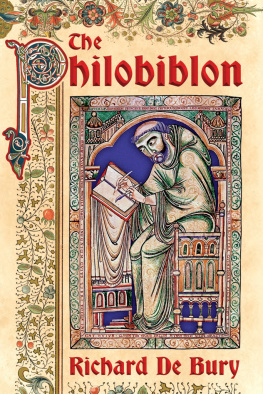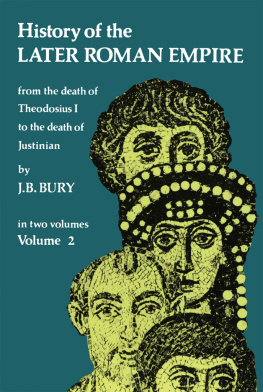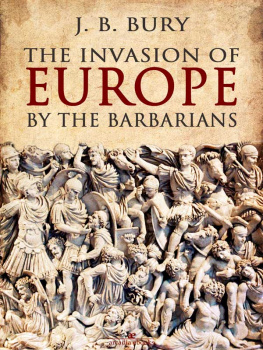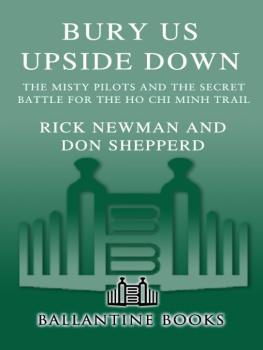
Copyright
Copyright 2019 by Dover Publications, Inc.
All rights reserved.
Bibliographical Note
This Dover edition, first published in 2019, is an unabridged republication of the work published by Philip C. Duschnes, New York, in 1945. The translation was done by Anthony Fleming West. The title page and the initial letters were designed by Valenti Angelo. A new Publisher's Note has been specially prepared for this Dover edition.
Library of Congress Cataloging-in-Publication Data
Names: Bury, Richard de, 12871345, author. | West, Andrew Fleming, 1853-1943, translator.
Title: The philobiblon / Richard De Bury.
Other titles: Philobiblon. English
Description: Mineola, New York : Dover Publications, Inc., 2019. | "This Dover edition, first published in 2019, is an unabridged republication of the work published by Philip C. Duschnes, New York, in 1945. The translation was done by Anthony Fleming West."
Identifiers: LCCN 2018054002| ISBN 9780486832463 | ISBN 0486832465
Subjects: LCSH: Book collecting.
Classification: LCC Z992 .B9813 2019 | DDC 002.075dc23
LC record available at https://lccn.loc.gov/2018054002
Manufactured in the United States by LSC Communications
83246501 2019
www.doverpublications.com
PUBLISHER'S NOTE
R ichard De Bury (12871345), named after the town of Bury St. Edmunds in Suffolk, England, where he was born, was descended from an English knight who fought with William the Conqueror in the eleventh century. De Bury studied at Oxford, became a priestultimately rising to be Bishop of Durhamand tutored the future English king Edward III. After Edward III became king in the 1320s, De Bury served Edward's government in various high administrative and diplomatic posts. On a diplomatic mission to the papal court while in exile at Avignon in 1330, De Bury met the Italian scholar and poet Petrarch, with whom he shared his devotion to and enthusiasm for books, and who left a brief account of meeting his English counterpart. Wherever he went, De Bury assiduously collected manuscripts and bound books, and in time composed this short collection of Latin essays about his passion for books, The Philobiblonthe title was created by De Bury from the Greek words meaning "the love of books." His intent was, no doubt, to encourage his fellow clerics to pursue the love of learning via the collecting and reading of books, as he himself had done. De Bury completed the text in 1345, and it circulated in manuscript form throughout the late medieval world. Publication as a book would have to await the invention of printing with movable type in the following century.
The first printed edition of De Bury's Philobiblon appeared at Cologne in 1473, and several others soon followed as the invention of the printing press spread throughout the late medieval world. The first English translation was published early in the nineteenth century. The titles of some of the chapters give a good idea of the nature of the work, combining the author's love for and commitment to the importance of books and the knowledge they contain, with thoughts on collecting them, lending them, teaching with them, and simply enjoying them: "That the Treasure of Wisdom lieth especially in books," "What love is reasonably due to books," "Who ought to be the especial lovers of books," and "Of the manner of distributing our books to all students."
Bibliophiles, to the present day, consider this short text to be one of the first ever written that studied, defined, and, above all, praised their passion, the all-encompassing love of books. Some readers have valued it as one of the earliest written works to take up the concerns of libraries and librarians. Unfortunately, De Bury's remarkable and, in its time, unique library was dispersed after his death, and only two books now exist that are known to have belonged to himan edition of the works of John of Salisbury now in the British Library in London, and a collection of theological treatises in the Bodleian Library at Oxford.
This Dover edition is a reprint of the edition published in New York in 1945 by Philip C. Duschnes. It was published on January 24, 1945, to commemorate the 600th anniversary of its completion on Richard de Bury's birthday, January 24, 1345. The translation by Anthony Fleming West was first published by the Grolier Club, New York, in 1889. The title page and initial letters were designed by Valenti Angelo.

THE PROLOGUE
 o all the faithful in Christ unto whom the tenor of this present writing may come, Richard de Bury, by the Divine mercy Bishop of Durham, wisheth eternal health in the Lord, and also to present a pious memorial of himself before God, alike in life and after his decease.
o all the faithful in Christ unto whom the tenor of this present writing may come, Richard de Bury, by the Divine mercy Bishop of Durham, wisheth eternal health in the Lord, and also to present a pious memorial of himself before God, alike in life and after his decease.What shall I render unto the Lord for all his benefits toward me? asks the devout psalmist, that invincible king and chiefest of the prophets. In this most grateful inquiry he acknowledgeth himself a willing repayer and a manifold debtor, and a seeker after a counsellor holier than himself; agreeing with Aristotle, the prince of philosophers, who proves in the Third and Sixth of his Ethics that all action turns upon counsel. Surely, if so admirable a prophet, acquainted with the Divine secrets, desired so anxiously to meditate upon the way in which he might acceptably make return for these gracious benefits by rendering thanks, what shall we, who are but rude thankers and most greedy receivers, laden with endless Divine benefits, be able to resolve upon more worthily? Doubtless with anxious deliberation and redoubled circumspection (first invoking the septiform Spirit, to the end that His illuminating fire may glow in our meditation) we ought the more earnestly to prepare an open way, so that the Bestower of all things may be readily worshipped out of His gifts conferred upon us, our neighbour be relieved of his burden and the guilt daily contracted by sinners be atoned for by the remedy of alms.
Being forewarned, therefore, through this devout admonition by Him who alone anticipates and fulfills the desires of man, without whom no sufficiency is supplied us even for our meditation, and whose gift, we openly confess, is whatever good we may have done, we have diligently taken counsel with ourselves, as also by inquiring in company with others, what among the good offices of the divers kinds of piety would in the first instance be pleasing to the Most High and benefit the Church Militant.
And lo! there comes before our view a host of outcast scholars; nay, rather of chosen scholars, in whom God the Creator and His handmaiden Nature have planted the roots of most excellent character and noble knowledge. But so far hath the want of the necessaries of life oppressed them that, with an adverse fortune opposing them, the seeds of virtue, which are so fruitful, are left to parch in the untilled field of their youth, unmoistened by the favour of the needful dew. Thus it happens, in the words of Boethius, that bright virtue lies hidden in obscurity, and it is not that lamps are lighted and put under a bushel, but from want of oil are utterly gone out. Thus the field that flowers in the springtime is parched before the harvest. Thus the crops degenerate into weeds, the vines into the wild vine, the olives run to wood in the wild olive and the tender shoots waste away altogether, while those who might have grown up to be strong pillars of the Church, having been endued with the capacities of subtle minds, abandon the schools of study. Under poverty alone as their stepmother they are violently repelled from the sweetened cup of philosophy as soon as they have tasted it, to thirst again more fervidly by reason of the tasting. Though fit for the liberal arts and wholly disposed to meditation in the Scriptures, yet, deprived of the support of kinsmen, they return as by a kind of apostacy to the mechanical arts solely for the support of their living, to the loss of the Church and the degradation of the whole clergy. Thus Mother Church in begetting sons is forced to miscarry, nay, from her womb some unshapen offspring is born out of due time, and, from want of that small and slender support which suffices for nature, she loses famous pupils, who ought later to be promoted to be champions and athletes of the faith. Alas, how suddenly the web is cut while the hand of the weaver is yet working! Alas, that the sun is eclipsed in the brightness of its dawning and the advancing planet retrogrades in its course, and, though it displays the form and nature of a true star, suddenly falls and becomes a meteor! What more pitiful can a pious man behold? What will pierce more sharply the bowels of compassion? What will sooner melt a heart, though hardened as an anvil, into the warmest tears?

 THE PROLOGUE
THE PROLOGUE o all the faithful in Christ unto whom the tenor of this present writing may come, Richard de Bury, by the Divine mercy Bishop of Durham, wisheth eternal health in the Lord, and also to present a pious memorial of himself before God, alike in life and after his decease.
o all the faithful in Christ unto whom the tenor of this present writing may come, Richard de Bury, by the Divine mercy Bishop of Durham, wisheth eternal health in the Lord, and also to present a pious memorial of himself before God, alike in life and after his decease.












